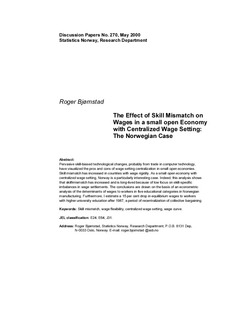| dc.contributor.author | Bjørnstad, Roger | |
| dc.date.accessioned | 2012-01-31T19:08:28Z | |
| dc.date.available | 2012-01-31T19:08:28Z | |
| dc.date.issued | 2000 | |
| dc.identifier.issn | 1892-753x | |
| dc.identifier.uri | http://hdl.handle.net/11250/180761 | |
| dc.description.abstract | Pervasive skill-biased technological changes, probably from trade in computer technology, have visualized the pros and cons of wage setting centralization in small open economies. Skill mismatch has increased in countries with wage rigidity. As a small open economy with centralized wage setting, Norway is a particularly interesting case. Indeed, this analysis shows that skill\mismatch has increased and is long-lived because of low focus on skill-specific imbalances in wage settlements. The conclusions are drawn on the basis of an econometric analysis of the determinants of wages to workers in five educational categories in Norwegian manufacturing. Furthermore, I estimate a 15 per cent drop in equilibrium wages to workers with higher university education after 1987, a period of recentralization of collective bargaining.
Keywords: Skill mismatch, wage flexibility, centralized wage setting, wage curve | no_NO |
| dc.language.iso | eng | no_NO |
| dc.publisher | Statistics Norway, Research Department | no_NO |
| dc.relation.ispartofseries | Discussion Papers;No. 270 | |
| dc.subject | Wages | no_NO |
| dc.subject | Small open economy | no_NO |
| dc.subject | Norway | no_NO |
| dc.subject | JEL classification: E24 | no_NO |
| dc.subject | JEL classification: E64 | no_NO |
| dc.subject | JEL classification: J31 | no_NO |
| dc.title | The Effect of skill mismatch on wages in a small open economy with centralized wage setting: The Norwegian case | no_NO |
| dc.type | Working paper | no_NO |
| dc.subject.nsi | VDP::Social science: 200::Economics: 210::Economics: 212 | no_NO |
| dc.source.pagenumber | 24 s. | no_NO |
